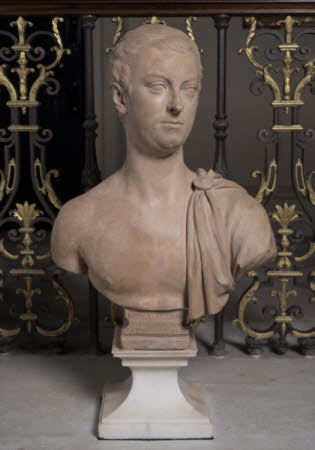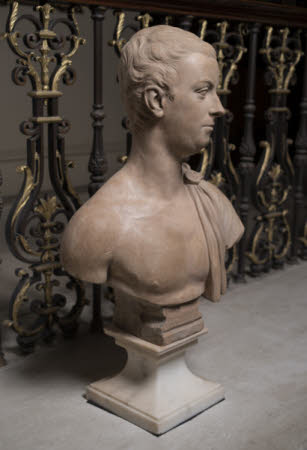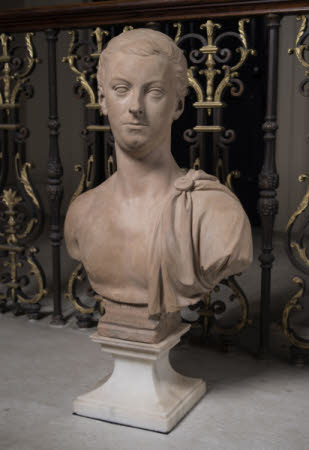Portrait bust of John Hervey, 2nd Baron Hervey of Ickworth (1696-1743)
Edmé Bouchardon (Chaumont 1698 - Paris 1762)
Category
Art / Sculpture
Date
1729 (inscribed and dated)
Materials
Terracotta
Measurements
700 x 460 mm
Place of origin
Rome
Order this imageCollection
Ickworth, Suffolk
NT 852228
Summary
Sculpture, terracotta; Portrait bust of John, Lord Hervey (1696-1743); Edmé Bouchardon (Chaumont 1698-Paris 1762); Italy, Rome, 1729. The bust depicts the politician and writer John, 2nd Baron Hervey, who in 1728-29 made a trip to the Continent with his friend Stephen Fox. His portrait was commissioned from the French sculptor Edmé Bouchardon when the two men were in Rome in 1729. This terracotta version of the portrait would have served as the basis for the marble portrait bust, now in a private collection, whilst there is also an early copy of the marble at Ickworth. The concept of the bust derives from Roman portraiture but is at the same time daringly modern, with Lord Hervey shown without a wig and naked, except for a toga-like robe over his left shoulder. The bust is also a celebration of youthful male beauty, reflecting the close personal relationship at this time between Hervey and Fox.
Full description
A portrait bust in terracotta depicting John, 2nd Baron Hervey (1696-1743), made in 1729 in Rome by Edmé Bouchardon. The sitter is shown wigless and in bust form, the arms truncated below the shoulders. His torso is naked except for a toga-like garment over his left shoulder, fastened at the shoulder with a circular brooch. Hervey looks slightly upwards and to his left. Mounted on a rectangular terracotta base with an inscription and date. The bust formerly had several coats of paint, as reported in 1972 (letter of 20 December 1972 from St John Gore, National Trust Historic Buildings Secretary, to the Hon. David Erskine. National Trust National Curatorial archive). It was subsequently conserved and restored in 1992-93 by John Larson of the National Museums and Galleries on Merseyside, Liverpool. This extraordinary portrait bust is one of a very small group of highly innovative portraits sculpted in Rome between 1727 and 1730 by the French sculptor Edmé Bouchardon (1698-1762). In his lifetime Bouchardon was regarded by many critics in France as the greatest sculptor of his age. He has often been cited as a precursor of later eighteenth-century Neo-classicism, although this is in some ways an over-simplistic assessment of the sculptor’s work. As a young man, Bouchardon spent nine formative years at the Académie de France in Rome, before returning to France, where he settled in Paris and was quickly appointed sculptor to the king. His career was certainly blessed by good fortune - he was singled out for favours by the directors of the Academy in Rome and, once back in Paris, was quickly elected a member of the Académie Royale and actively supported by leading lights within the city’s artistic and intellectual circles. Something of the austere, ascetic philosophy he adopted in his life can be felt in the portrait of John Hervey. Bouchardon seems to have been successful enough not to have been over-hampered by the necessity to take on whatever work he could find, but he invariably took an almost obsessive care over the preparation and finishing of his work, from his drawings to more important commissions. The engraver Charles-Nicolas Cochin, who was among those who were more critical of Bouchardon, wrote of the sculptor’s most important work, an enormous bronze equestrian statue of king Louis XV, destroyed in the French Revolution, that Bouchardon had wanted his monument to be ‘filed down and chiselled all over, and finally finished off as if it were some piece of goldsmith’s work.’ Overall, Bouchardon’s sculpture can be characterized as highly inventive, carefully conceived and finished, extremely graceful and beautiful, if on occasion a little bloodless. The subject of the portrait, John, Lord Hervey, was the eldest of the sixteen children produced by John Hervey, 1st Earl of Bristol (1665-1751) and his second wife, Elizabeth Felton (1676-1741), eleven of whom would survive to adulthood. He was one of the most socially successful and interesting members of the Hervey family, and one of the best-known figures of his age as courtier, politician and memoirist. Sickly during childhood, Hervey was educated at home before finally entering Westminster School only at the age of fifteen. After graduating from Cambridge in 1715, he undertook a continental journey, visiting not Italy, but Paris and then Hanover, home of the new Hanoverian monarchs of Great Britain and Ireland, where he met Prince Frederick, second heir to the throne. In 1720 Hervey married Mary Lepel (1696-1768), one of the ladies-in-waiting to Queen Caroline, consort of King George II and mother of Prince Frederick. Despite his numerous affairs with both women and men, John Hervey and Molly Lepel enjoyed a happy marriage that produced eight children. In 1723 his elder half-brother Carr died, leaving John as his father’s heir with the courtesy title Lord Hervey; in 1725 he succeeded Carr as Member of Parliament for Bury St Edmunds. Even in an age of extremes John Hervey was regarded by society as excessively effeminate, using rouge and behaving in a camp manner that earned him the nickname Lord Fanny from the satirical poet Alexander Pope, who also derided Hervey in his poem 'Epistle to Dr Arbuthnot', published in 1735, in which he appears as a character named Sporus: ‘Let Sporus tremble – ‘What, that thing of silk, Sporus, that mere white curd of ass’s milk? Satire or sense, alas! Can Sporus feel? Who breaks a butterfly upon a wheel?’ In similar vein, the well-known quip that when God created the human race, he made men, women and Herveys, often attributed to Hervey’s friend Lady Mary Wortley Montagu (1689-1762), is sometimes believed to refer principally to John Hervey and his bisexuality. In the later 1720s Hervey met Stephen Fox (1704-1776, later Stephen Fox-Strangways, 1st Earl of Ilchester), with whom he would undertake his journey to Italy in 1728 and 1729. Although the precise nature of their relationship is not known, it is usually thought that the two men were lovers; they certainly remained close friends for the rest of Hervey’s life, whilst Stephen Fox was also on excellent terms with Molly Hervey. The ostensible reason for Hervey’s desire to undertake the trip, leaving behind his anxious wife and their young family, was his ill health, but it is likely that this was in part an excuse for him and Fox to travel together on what was effectively the completion of Hervey’s Grand Tour. John Hervey certainly though suffered throughout his life from ill health, including epilepsy, and does appear to have been seriously ill earlier in 1728. In 1731, two years after his return he drew up a document entitled ‘An Account of My Own Constitution and Illness… For the Use of My Children’ (Hervey 1931, III, pp. 961-87), justifying his trip by claiming that he had been suffering so severely from trembling nerves, giddiness and fainting fits that he had concluded that his only chance for a cure lay in a trip to warmer climes: ‘I took the resolution, therefore, of going abroad, when Mr. Fox, with an affection and friendship I am as incapable of forgetting, as any nature but his is incapable of feeling, offered to go with me to any part of the world, and for as long as I pleased.’ (Hervey 1931, p.974). The two men left England for Ostend in July 1728 and visited a spa, before travelling south via Paris, Lyons, Turin and Florence. They arrived in Rome at the beginning of December, leaving at the end of the month for a three-month stay in Naples where Hervey blamed his continuing poor health on the severe winter weather. The two men were back in Rome by mid-April and remained in the city until early June. The warmer spring weather seems to have improved the health of both Hervey and Fox. It was during this second stay that Hervey’s portrait was commissioned from Edmé Bouchardon. The serene image hardly suggests a man who had been seriously ill, although the distended chin reflects the tumour growing below the chin that Hervey is known to have had removed in Florence a month or two later, probably by the well-known physician Antonio Cocchi (1695-1758). The portrait may have been commissioned by Stephen Fox rather than Hervey, since the original marble bust is today in the collections of his descendents at Melbury House (Baker, Harrison and Laing 2000, pp. 753-54, fig.25). The bust, in its marble and terracotta versions, is part of a small group of portraits made by Bouchardon between 1727 and 1730, most of which depict British visitors to Rome. The series began with a portrait bust of the German antiquary, dealer and spy Baron Philipp von Stosch (1691-1757), dated 1727 and now in the Skulpturensammlung in Berlin (Bouchardon 2016, no. 46). It was the first portrait made by the sculptor who, at this time, was in the middle years of his long stint as a pensionnaire at the French Academy in Rome. In 1728 Bouchardon made a portrait of the twenty-year old John Gordon, 2nd Baron of Invergordon (?1707-1783), which is very close in style to the bust of Lord Hervey although it shows the sitter with an entirely naked torso (Highland Council; Bouchardon 2016, no. 48). These three busts form a coherent group, to which may be added a female portrait bust made in 1730, of Lady Lechmere, now in Westminster Abbey (Baker, Harrison and Laing 2000, pp. 753-55, fig. 27). These sculptures are derived from elements in Roman sculptures, but also show knowledge on the sculptor's part of ancient gems. Reference to Roman prototypes is allied with a daring modernity. The bust of Baron Stosch is based on a Roman bust of the Emperor Trajan (Capitoline Museums, Rome). The sitter is portrayed with the torso nude except for a toga over the left shoulder, fastened with a brooch, the same solution adopted for the bust of Lord Hervey. In the more demurely-conceived bust of Lady Lechmere, she has fuller, very beautifully-carved drapery, with only her right shoulder bared. In all four busts the head is turned and the sitter looks outwards with an abstracted gaze. Of the three men, Stosch was the oldest and is depicted in early age, whilst the much younger John Gordon is the purest depiction of male beauty, his torso entirely naked. The bust of Hervey shows a man who was then in his thirties and affected by illness. His state is most clearly alluded to in the pendulous chin with its tumorous growth, that would be removed in Florence a few months later, but the sculptor has also captured a slight coarseness in Hervey’s features. The terracotta bust differs from the marble version mainly in the form of the socle, which is here waisted and rectangular in shape, whereas for his marble busts Edmé Bouchardon employed the same formula of a turned socle with a cartouche name plate with scrolled ends. Bouchardon’s inscriptions very unusually run round the lower edge of the socle and, in the case of the bust of John Gordon, also underneath the bust, below the right shoulder. The terracotta bust at Ickworth has an inscription in English that is generally assumed to have been added later. However, this inscription gives some appearance of having been fired with the remainder of the bust, whilst elements of the epigraphy seem to be similar to Bouchardon’s inscriptions on his marble busts. So it is possible that it was applied by the sculptor in Rome, the precise form of the inscription presumably being dictated by Stephen Fox and John Hervey. The other mystery concerning this portrait is the presence at Ickworth of a second marble version of the bust (NT 852225). This is clearly inferior to the marble version made in Rome in 1729 and cannot be a replica by Bouchardon. It has usually been assumed to have been made in the nineteenth century. The marble bust was certainly in existence by 1848, when it was engraved as the frontispiece for John Wilson Croker’s edition of Lord Hervey’s Memoirs of the Reign of George the Second, published in London in 1848. But it was probably again the marble rather than the terracotta which was the basis for another frontispiece, to 'Letters between Lord Hervey and Dr. Middleton concerning the Roman Senate', edited by Thomas Knowles, former chaplain to Lady Hervey, and published in London in 1778. This means that the copy at Ickworth is likely to have been made reasonably early, perhaps even during John Lord Hervey’s lifetime. It has in fact been suggested that the marble bust might even have been made in the workshop of the Anglo-Flemish sculptor John Michael Rysbrack (1694-1770), since a satirical poem in the Grub Street Journal for 20 September 1736 centres around Stephen Fox spying a bust of John Hervey being made in that sculptor’s workshop (Baker, Harrison, Laing 2000, p. 762; Malcolm Baker in Bowron and Rishel 2000, p. 229-30, no. 107). Jeremy Warren July 2025
Provenance
Commissioned by Lord John Hervey, 2nd Baron Hervey of Ickworth (1693-1743) or by Stephen Fox, later Fox Strangeways, 1st Earl of Ilchester (1704-1776); executed in Rome 1729; by descent though the Hervey family; acquired by the National Trust in 1956 as part of the Bristol Collection under the auspices of the National Land Fund, later the National Heritage Memorial Fund.
Marks and inscriptions
Incised into front of socle: : JOHN LD. HERVEY. / BY BOUCHARDON / AT ROME 1729. JOHN L HERVEY | BY BOUCHARDON | AT ROME 1729
Makers and roles
Edmé Bouchardon (Chaumont 1698 - Paris 1762), sculptor
Exhibition history
Edme Bouchardon: de sanguine et de marbre, Musée du Louvre, Paris, 2016, no.cat.49
References
Knowles 1778: Thomas Knowles, ed., Letters between Lord Hervey and Dr. Middleton concerning the Roman Senate, London 1778 Hervey 1848: John, Lord Hervey, ed. John Wilson Croker, Memoirs of the Reign of George the Second, London 1848 Hervey 1931: John, Lord Hervey, ed. R. Sedgwick, Some Materials towards Memoirs of the Reign of George II, 3 vols., Cambridge 1931 Halsband 1973: Robert Halsband, Lord Hervey: Eighteenth Century Courtier, Oxford, Clarendon Press1973, p. 82 Baker, Harrison and Laing 2000, Malcom Baker, Colin Harrison and Alastair Laing, 'Bouchardon's British sitters: sculptural portraiture in Rome and the classicising bust around 1730', The Burlington Magazine, December 2000, no 1173, vol. CXLII, pp. 752-62, fig. 26. Bowron and Rishel 2000: E. P. Bowron and J. J. Rishel, eds., Art in Rome in the Eighteenth Century, exh cat., Philadelphia Museum of Art, March 16-May 28, 2000 and the Museum of Fine Arts, Houston, June 25-September 17, 2000, Philadelphia 2000, p. 230 Moore 2000: Lucy Moore, Amphibious Thing. The Life of Lord Hervey, London 2000, p. 56, Pl. 2. Roscoe 2009: I. Roscoe, E. Hardy and M. G. Sullivan, A Biographical Dictionary of Sculptors in Britain 1660-1851, New Haven and Yale 2009, p. 127, no. 2. Baker 2011: Malcolm Baker, ‘Commemoration “in a more durable and grave manner”: Portrait Busts for the British in early Eighteenth-Century Rome,’ in David Marshall, Susan Russell, Karin Wolfe, Roma Britannica, London 2011, pp. 273-83 Desmas 2012: Anne-Lise Desmas, Le Ciseau et la Tiare. Les Sculpteurs dans la Rome des Papes 1724-1758, Rome 2012, p. 298, Pl. 92b. Bouchardon 2016: Edmé Bouchardon: 1698-1762, une idée du beau, exh. cat., Musée du Louvre, Paris 2016, pp. 124-125



